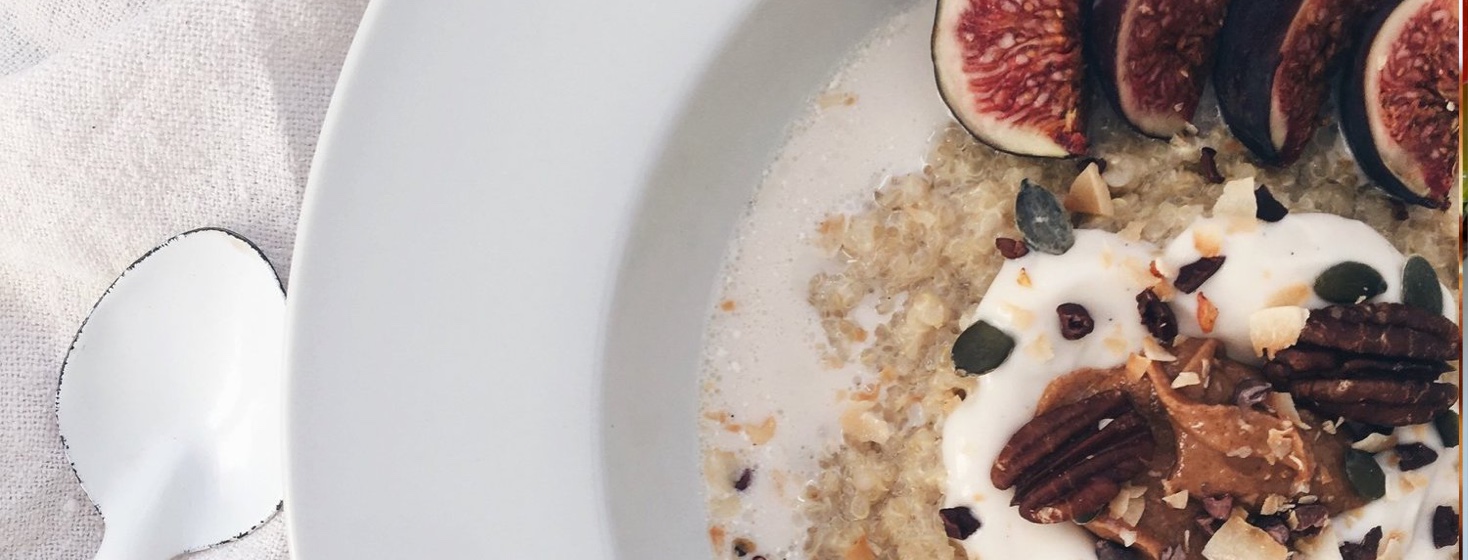Coconut Whole Grain Porridge for Healthy Ovulation
This recipe makes a great breakfast for supporting healthy ovulation. Why is that important? For so many reasons, and not just fertility!
I recently polled my Instagram audience and 87% of them suffer with PMS symptoms, and PMS is caused by hormonal imbalances like estrogen dominance or low progesterone. Endometriosis is often hard enough to deal with and I doubt any of us wants to add PMS symptoms on top of that!
One of the causes of estrogen dominance/low progesterone is a lack of ovulation. What many of us don’t realize is that having a period doesn’t mean you’ve ovulated! And ovulation is essential for healthy progesterone production. Progesterone is made from the corpus luteum, which is the sack (follicle) that contains our mature and ready to ovulate egg and once the egg is released during ovulation, the sack turns into a temporary gland called the corpus luteum, which released progesterone during the second half of our cycle. Without healthy progesterone levels, we enter an estrogen dominant state, where our estrogen levels are higher than our progesterone and this causes a myriad of symptoms from insomnia, to anxiety, sore breasts, and clotty periods.
So how can we support healthy ovulation? There are a couple of key strategies, but one of them is ensuring we’re eating a nutrient dense diet in the lead up to ovulation, that is rich in fats and complex carbohydrates to produce healthy levels of hormones (fat is required to make hormones!), nourish the follicles, and provide fuel for the energy-intensive process of ovulation. It’s also crucial to balance our blood sugar, as dysregulated blood sugar stresses the body and has a knock-on effect on our hormones.
So, this breakfast is designed with that in mind. I originally created it for my blog, This EndoLife, but realized it was in need of a spruce up! This recipe is rich in protein, fat, and slow-releasing carbohydrates, as well as anti-inflammatory antioxidants from the raspberries. The balance of these three macro nutrients should keep you feeling satisfied, full, and stable, but if you find you’re still hungry or crashing afterwards, you need to adjust the quantities to find a ratio that suits your blood sugar – usually an increase in protein will help (you can add a scoop of protein powder). The fiber from the optional inulin syrup should also help with blood sugar stability too!
This recipe is also designed using Alisa Vitti’s Woman Code protocol, and I’ve used her list of foods that support ovulation for the ingredients.
Prep time: 10 minutes
Cook time: 20-25 minutes
Servings: 1
Ingredients for coconut whole grain porridge
- 40g dry quinoa (or any protein-rich whole grain such as amaranth, just cook according to the specific instructions for the grain you choose)
- 100ml full fat coconut milk (the kind from a can, not coconut drinking milk from a carton)
- 100ml almond milk (look for a sugar-free version, ideally)
- Water, as needed
- 50g (or more, if desired) of a dairy-free, good quality yoghurt such as a nut or coconut-based brand. Almond would be a good choice here!
- 1 Tbsp almond butter (or more if desired)
- Handful of pecans
- Tablespoon of pumpkin seeds
- 80g of raspberries (I used figs in this picture, which are also great for ovulation!)
- Inulin syrup to sweeten, if desired (I like Troo)
- Toppings of choice
Directions for coconut whole grain porridge
- Rinse the quinoa/whole grain and add to a small saucepan along with the coconut and almond milk.
- Over a moderate heat, allow the milks to come to a boil and then lower to a simmer, and cover for 20 minutes. Traditionally, quinoa is cooked until all the water is absorbed and the grain is fluffy, but we want to retain some liquid so it’s a porridge and not just a grain dish, so keep topping up with water to allow the grain to cook but to retain the creamy liquid. If your grain is still hard at the 20-minute mark, cook until soft though some people like to keep a little ‘bite’ with their quinoa!
- Once your grain is cooked, stir in about half of the yoghurt or more if you’d prefer an even creamier texture.
- Serve in a bowl, add a dash of extra milk if you’d like, and then finish off your porridge with almond butter, pecans, pumpkin seeds, the leftover yoghurt (or more if you’d like), raspberries (or whatever fruit you’d like), inulin syrup, and any additional toppings.
This is a bit of a lengthy breakfast (for me anyway), so I keep this to weekends or batch cook so it’s ready to go!
Nutrition facts
Per Serving
- calories: 680
- fat: 49.3g
- protein: 18.8g
- sodium: 12.3mg
- sugar: 7.6g
Disclaimer: Endometriosis.net does not provide any express or implied warrant toward the content or outcome of any recipe.

Join the conversation